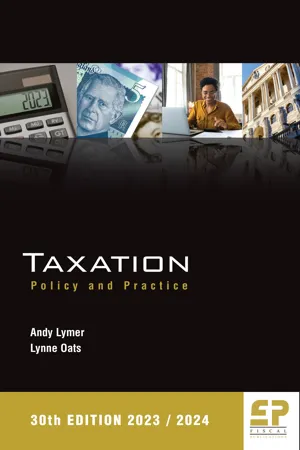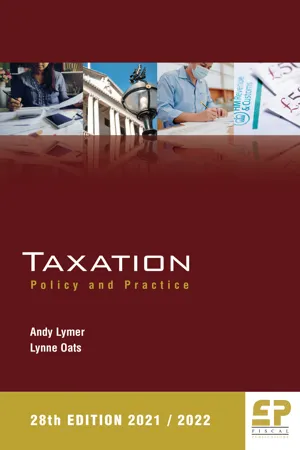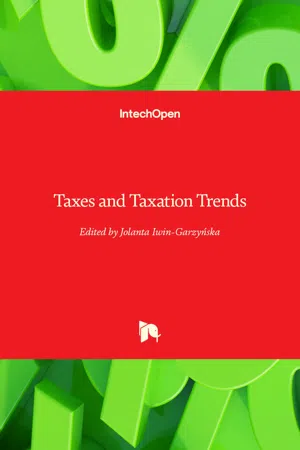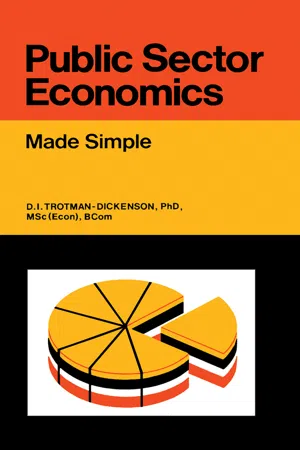Economics
UK Taxes
UK taxes refer to the compulsory financial contributions imposed by the government on individuals, businesses, and other entities to fund public expenditures. These taxes include income tax, value-added tax (VAT), corporate tax, and various other levies. The UK tax system is administered by HM Revenue and Customs (HMRC) and plays a crucial role in financing public services and government operations.
Written by Perlego with AI-assistance
Related key terms
1 of 5
7 Key excerpts on "UK Taxes"
- Andy Lymer, Lynne Oats(Authors)
- 2023(Publication Date)
- Fiscal Publications(Publisher)
Tax reliefs can be offered by a government to encourage activity that might not otherwise occur but that is considered beneficial for society in some way. For example, creating freeports or enterprise zones which have lower than normal taxes to persuade businesses to locate in particular areas. We will look more closely at how taxes are used to influence behaviour in the UK in Chapter 14. Taxation, therefore, is a very important feature of a modern society and the nature of a particular tax system reflects the views of its society, and government, at a point in time. Tax systems change regularly as society modifies its views on how best to balance the various aspects of the basic functions of government listed above. They also change as society’s views of the relative importance of particular issues in the society, such as environmental protection, change over time. Significant changes in the tax system often occur when government philosophies change, such as when power in the Government shifts from one political party to another after an election. Changes, and sometimes innovations, may also be required as a response to global events such as pandemics and wars. 1 The framework of UK taxation 3 What is a tax? 1.3 Before we study the history of tax and examine the current UK rules for taxation in detail, we must understand what a tax is. All taxes have some features in common. A tax is a compulsory levy, imposed by government or other tax raising body, on income, consumption, wealth or people, for which the taxpayer receives nothing specific in return. Not all payments to a government are taxes. Charges, fees for services, costs for provision of goods supplied by a government entity (e.g. electricity if the supply if state owned), tolls and other levies could be paid to a government, but where they are paid simply to cover the cost of providing something specific in return then they are not strictly taxes.- Andy Lymer, Lynne Oats(Authors)
- 2021(Publication Date)
- Fiscal Publications(Publisher)
1 1 The framework of UK taxation 2 Objectives of taxation 1.2 Taxation is used as a tool by the UK government to support and pay for its basic functions. These basic functions include: Managing the economy – including employment levels, the nature, type and location of business activity, levels of inflation, the balance of payments and relationships with our trading partners overseas; Regulation – protection of the environment, the public generally or of groups within society who might otherwise be exploited; Developing society – providing a social welfare and health system to improve the standards of living for the whole society. This includes providing for the country’s needs in times of crisis of course – something we are all having lots of experience of right now; Providing public goods – provision of products and services for common consumption that would be unlikely to be adequately provided by the market. These include defence and education systems for example. The primary purpose of imposing a tax on society is to raise money to pay for public (government) spending in performing the basic functions listed above. This can be achieved by covering costs as they are incurred, or by funding repayment of government borrowing. However, taxes are also used to influence the behaviour of taxpayers directly in ways that will support achieving these functions for society’s benefit. For example, taxes are charged on petrol, alcohol and tobacco (in part at least) to increase their cost in the attempt to discourage their consumption in order to improve the environment and health of the country. Tax reliefs can also be offered by a government to encourage activity that might not otherwise occur but that is considered beneficial for society in some way. For example, creating freeports or enterprise zones which have lower than normal taxes to persuade businesses to locate in particular areas.- eBook - PDF
Social Policy Review 26
Analysis and Debate in Social Policy, 2014
- Farnsworth, Kevin, Irving, Zoë(Authors)
- 2014(Publication Date)
- Policy Press(Publisher)
Finally, it will outline some proposals that can contribute to addressing the enormous increase in inequality in the UK since the 1970s. The main UK Taxes in 2012 First, we will consider what taxes are currently collected in the UK. Taking the forecasts for 2012/13 as a snapshot (Table 4.1 below), we see Social Policy Review 26 66 that the vast majority of tax revenues are raised through personal rather than corporate taxation.The largest single revenue-raiser is income tax, which is a direct tax on earned and unearned income, accounting for over one quarter of all revenues. It is the tax that has the highest profile both in terms of public recognition and in terms of media reporting. Its annual yield, however, is outweighed by that of indirect taxes, including Value Added Tax (VAT), when taken together. Indirect taxes are ‘indirect’ because they are collected by an intermediary (such as a retailer) from those bearing the economic cost (typically the consumer); they include excise duties on tobacco, alcohol and hydrocarbon oils and stamp duty on house purchases, and they account for around one third of all revenues. National Insurance Contributions (NICs) which, because they have been largely de-linked from specific benefits, are very similar to income tax albeit levied on earned income only, raise about one sixth of all revenue. Income tax, NICs and indirect taxes including VAT between them account for around three-quarters of all tax revenues. Taxes on businesses, including corporation tax, which is levied on profits, raise a modest amount of revenue, around one eighth of the total. At the local level, business rates and Council Tax raise about the same amount as each other.The contribution of other taxes is very small in comparison with these main taxes. - eBook - PDF
- Jolanta Iwin-Garzy?ska(Author)
- 2018(Publication Date)
- IntechOpen(Publisher)
It provides a brief overview of the rather complicated system of different taxes in the UK. Three main taxes— personal income tax, national insurance contributions (NICs) and value added tax (VAT)— are shown to account for about three quarters of all tax revenues and that this has been stable over a period of time. In comparison to other countries the UK is similar in its tax composition to both the US and France, where the same three types of tax dominate rev-enues. It is much less similar to both Malaysia and Argentina. The study examines monthly UK tax revenues for these three taxes, using econometrically estimated trends. It finds that, in constant price terms, revenues have grown slowly and steadily over time, broadly keep-ing pace with growth in real GDP. Tax revenue forecasting in the UK is mainly undertaken by an independent body which publishes forecasts at the level of receipts for individual taxes. This considerably reduces the risk of political bias in these revenue forecasts. Keywords: UK, tax composition trends revenues forecasting 1. Introduction The UK tax system includes a wide range of different taxes. The system is complex and inter -ested readers are referred to Pope and Waters [1] for a more complete survey. The main taxes include: • Personal income tax. Almost all forms of income are subject to tax but the rate of tax ap-plied is determined by a series of income bands and subject to allowances against tax. Ev-ery taxpayer is given a personal allowance (£11,000 in 2016–2017) which is deducted from their pre-tax income before income tax is levied. The allowance is reduced for incomes over £100,000. The rate of tax varies according to bands. In 2016–2017 the basic tax rate of 20% © 2018 The Author(s). - eBook - PDF
- William Craig(Author)
- 2014(Publication Date)
- EUP(Publisher)
All taxes, whether direct (on profits and gains) or indirect (consumption taxes), are administered by HMRC, using the powers granted under 5 THE STRUCTURE OF THE TAX SYSTEM 1 These statutes are collectively known as the “Taxes Acts”. 2 Under an ongoing programme of reform known as “Tax Law Rewrite”, introduced under FA 1995. 54 REVENUE LAW the Taxes Management Act 1970 mentioned above. This organisation was formed in 2004 by the merger of the former Inland Revenue, and Customs & Excise, to form a unitary tax agency. LEGAL FRAMEWORK Legislation The UK tax year revolves around two main matters: the Budget delivered by the Chancellor of the Exchequer, which is usually in March, 3 and the passage of the Finance Act, which is usually introduced within 2 weeks of the Budget and, after normal parliamentary scrutiny, 4 usually passes into law the day after it receives the Royal Assent. Provisions contained in the Budget come into force on Budget Day, or if specified on another stated date such as the start of the next tax year, and are confirmed into force by passage of the Finance Act. In order to continue the financial affairs of the country between the Budget and the passage of the Finance Act, a resolution must be passed under the Provisional Collection of Taxes Act (PCTA) 1968, stating that it is “expedient in the public interest to introduce, vary or abolish a tax”. This must be followed by a confirmatory resolution within 10 business days and will come into effect for the period until: • the Finance Act becomes law; • the PCTA resolution is rejected by Parliament; • Parliament is dissolved. Case law Tax law in the UK is a statutory system structured and controlled by the process laid out above. Despite this framework there will always be areas of dispute which must be resolved by the courts. In such disputes the taxpayer may appeal in the first instance to the General Commissioners or, in some specified cases, the Special Commissioners. - eBook - PDF
Public Sector Economics
Made Simple
- D. I. Trotman-Dickenson(Author)
- 2014(Publication Date)
- Made Simple(Publisher)
Estimates by the Inland Revenue indicate that the total undeclared income per year amounts to about £12,000 million and this involves a tax loss of between £3,00O-£3,500 million (House of Commons, Committee on Public Accounts, 29th Report, 1980). On these figures undeclared income was equivalent to about 9 per cent of the national income and the tax loss to 12 per cent of the proceeds from income tax. It has to be remembered, however, that according to the Inland Revenue the error rate of assessment under the Pay-as-You-Earn tax system is high. The figures for the 'black economy' can only be a rough estimate. Costs of administration and collection have increased as the tax system has become more complex, the level of taxation higher and the 'black economy' bigger. In 1981 (1982 Report) the Inland Revenue and the Board of Customs and Excise employed some 100,000 people and the cost of the two departments was approximately £900 million, which was about equal to the net proceeds from car tax and the tax on wine combined. Summary 1 The taxable capacity of a country is the proportion of its national income that is above the subsistence level. 2 A limit to taxable capacity of 25 per cent of national income has been suggested by C. Clark and endorsed by Lord Keynes—most leading industrial countries have exceeded it. 3 Incidence of taxation indicates on whom the final burden of a tax rests. It can be formal or effective incidence. 4 Some indirect taxes can be shifted to consumers depending on the price elasticity of demand. This can be illustrated by diagrams (see fig. 12.1). 5 The tax burden can be measured by reference to the taxpayers or to the national economy. Taxable Capacity, Incidence of Taxation and the Tax Burden 167 Suggested Further Reading Hicks, U., Public Finance, Cambridge University Press, Cambridge, 1971. Kay, J. Α., and King, Μ . Α., The British Tax System, Oxford University Press, 1980. Lewis, Α., Psychology of Taxation, Heinemann, London, 1982. - eBook - PDF
In the Shadow of Adam Smith
Founders of Scottish Economics 1700–1900
- Donald Rutherford(Author)
- 2017(Publication Date)
- Red Globe Press(Publisher)
John Millar (1787) reminds us of the late emergence of taxation as the principal way of financing the state. He mentions that taxes were virtually unknown in Saxon England. The public revenues came from the income of the king’s demesne and from fines and forfeitures. However, King John of England, like Henry III, raised much Crown revenue from indirect taxes in the form of aids and scutages (under feudalism, money paid to avoid personal service); King John gave parliament exclusive power to impose them. For example, tradesmen needed protection for the transport, sale and store of their goods, therefore the king could demand a portion of goods or other payment. Because such duties were established by long usage they were called customs. Sinclair, in his History of the Public Revenue of the British Empire (1790), notes that ‘The power of a State must greatly depend on the income it pos-sesses’ (p. 3), and reports that permanent taxes began about 1710; previously taxes lasted only as long as necessary to pay off the money borrowed on the credit of the tax. Particular taxes could have particular purposes. Originally, import duties and customs were paid for guarding the coasts from pirates and by foreign merchants for the liberty of trading in a sovereign’s dominions. Sir James Steuart had a simple notion of a tax: ‘a certain contribution of fruits, service, or money, imposed upon the individuals of a state by the act or consent of the legislature, in order to defray the expences of government’ ( Principles IV: 145). He classifies taxes according to what is taxed and how they are levied. For example, he divided taxes into proportional , such as cus-toms and excises, cumulative , which affect possessions, income and profits such as tithes, land tax, window tax and poor rates, and personal , in the form of service; he saw the latter as being a feudal practice replaced by monetary taxes.
Index pages curate the most relevant extracts from our library of academic textbooks. They’ve been created using an in-house natural language model (NLM), each adding context and meaning to key research topics.






